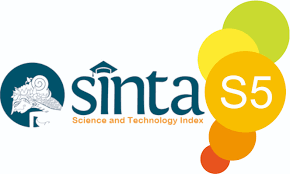Manajemen Krisis Destinasi Wisata Pasca Bencana Tsunami Selat Sunda oleh Humas Pemerintah
 Abstract views: 1384
,
Abstract views: 1384
,
 PDF downloads: 1520
PDF downloads: 1520
Abstract
The purpose of this research is to: (1). Obtained comprehensive descriptions of crisis management conducted in Tanjung Lesung tourist destination after Sunda Strait tsunami natural disaster by The Public Communication Bureau of the Ministry of Tourism. (2). Media options used by the Public Communications Bureau to support crisis management. This study uses an interpretive paradigm method with a qualitative descriptive approach and a case study as research strategy. The method of collecting data in this study was through direct interviews with the Ministry of Tourism's Public Communication Crisis Team. The results showed that the crisis management and strategy carried out was by conducting impact research and news in the media, making programming planning in the form of the appointment of aspokesperson, key public, publishing press releases regularly and organizing events. Besides that, the implementation involved several related communities in disseminating information.
Downloads
References
Biro Komunikasi Publik.2016. Laporan Tengah Tahunan Biro Komunikasi Publik T.A 2016. Jakarta: Kementerian Pariwisata.
Cutlip, Center & Broom. 2013. Effective Public
Relations. Jakarta : Kencana.
Daymon, Christine & Immy Holloway. 2002.
Metode-Metode Riset Kualitatif dalam Public
Relations dan Marketing Communications.
Terjemahan. Cahya Wiratama. Yogyakarta:
Penerbit Bentang.
Dewan Nasional KEK RI. 2018. Diakses pada
https://kek.go.id/kawasan/Tanjung-Lesung
Eva Safitri. (2018, Desember31). Update Jumlah
Korban Tsunami Selat Sunda: 437 Orang
Tewas14.059 Luka. Diakses pada https://news.
detik.com/berita/436569/update-jumlah-korban-
tsunami-selat-sunda- 437-orang-tewas-14059-
luka.
Fitrah, Muh dan Luthfiyah. 2017. Metodologi Penelitian : Penelitian Kualitatif, Tindakan dan Studi Kasus. Bojong Genteng : CV Jejak
Imran, Ayub I. 2017. Komunikasi Krisis. Yogyakarta : CV Budi Utama.
Kek.go.id. 2018. Diakses pada http://kek.go.id/ kawasan/Tanjung-Lesung.
Kemenpar.2019. Visi Kementerian Pariwisata. Diakses pada https://www.kemenpar.go.id/page visi-misi
Kencana, Maulandy Rizky Bayu. (2018,Desember
. Jababeka Merugi Rp 150 Miliar Akibat Tsunami Selat Sunda. Diakses pada https://www.liputan6.com/bisnis/read/3855927/
merugi-rp-150 -miliar-akibat-tsunami-selat-
sunda.
Medistiara, Yulida. (2018, Desember 23). Penjelasan Lengkap BMKG soal Tsunami Banten Akibat Anak Krakatau. Diakses pada https://news.detik.com/berita/d-4355674/ penjelasan-lengkap-bmkg-soal-tsunami-
banten-akibat-anak-krakatau
Mulyana, Deddy. 2006. Metode Penelitian Kualitatif. Bandung: PT Remaja Rosdakarya.
Nova, Firsan. 2011. Crisis Public Relations.
Jakarta: PT Raja Grafindo Persada
Nova, Firsan. 2014. PR War. Jakarta:Gramedia
Widiasarana Indonesia.
Nugroho, Sutopo Purwo. (2019, Januari 25) Rentannya Pariwisata dari Bencana. Diakses dari https://www.bnpb.go.id/ rentannya-pariwisata-dari-bencana
Nurtjahjani, Fullchis. 2018.Public Relations Citra
& Praktek. Malang : Polinema Press.
Rukajat ,Ajat. 2018. Pendekatan Penelitian Kualitatif. Yogyakarta : Deepublish.
Rully, Ramli. (2018,Desember 27) Tsunami Rusak
Ha Kawasan Ekonomi Khusus Tanjung Lesung. Diakses pada https://economy
okezone. com/ read/2018/12/27/470/1996536/
tsunami-rusak-8-ha-kawasan-ekonomi-khusus-
tanjung-lesung
Ruslan, Rosady. 2005. Kiat dan Strategi Kampanye
Public Relations. Jakarta: PT. Raja Grafindo
Persada.
Setiawan, Bram. (2019, April 2). Tiga Bulan Pasca Tsunami, Intip Kondisi Terbaru Tanjung Lesung. Diakses pada : google.com/amp/s/ travel.tempo.co
Supriadi, Bambang dan Nany Roedjinandari. 2017.
Perencanaan dan Pengembangan Destinasi
Pariwisata. Semarang: Universitas Negeri
Malayang
Tanjung Lesung.com. (2019, April15). Diakses dari https://www.tanjung lesung.com/
Taufik Siddiq. (2019, April 19). Ada Wilayah Terdampak Tsunami Selat Sunda Belum Dapat Bantuan. Diakses pada https://nasional.tempo.co/read/1158399/ada-wilayah-terdampak-tsunami-selat-sunda-belum-dapat-bantuan/ full&view=ok.
Copyright (c) 2019 Edutourism Journal Of Tourism Research

This work is licensed under a Creative Commons Attribution-ShareAlike 4.0 International License.
Authors who publish with this journal agree to the following terms:
- The author (s) keeps copyright on any article.
- The author grants the journal, right of first publication with the work simultaneously licensed under a Creative Commons Attribution License that allows others to share the work with an acknowledgement of the work’s authorship and initial publication in this journal.
- Authors can enter separate, additional contractual arrangements for the non-exclusive distribution of the journal’s published version of the work (e.g., post it to an institutional repository or publish it in a book), with an acknowledgement of its initial publication in this journal.
- Authors are permitted and encouraged to post their work online (e.g., in institutional repositories or on their website) prior to and during the submission process, as it can lead to productive exchanges, as well as earlier and greater citation of published work.
- We distributed the article, and any associated published material under the Creative Commons Attribution-Share alike 4.0 International License




